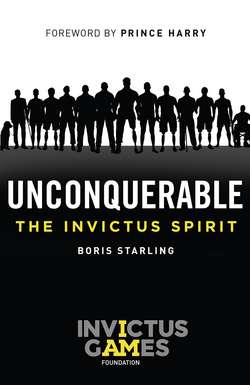Читать книгу Unconquerable: The Invictus Spirit - Boris Starling - Страница 8
INTRODUCTION
ОглавлениеWhen I started Unconquerable, my thinking was guided by two lines of belief. First, that the Invictus Games would be like the Olympics or Paralympics, where the medal table is both pride and curse and where lip service is paid to the importance of taking part while all the attention goes to those standing on the podium. Second, that there’d be a definite hierarchy within the WIS network. The wounded, those who’d lost limbs in battle, would, in a perverse way, be the glamour squad, the ones who’d suffered the most and whose very appearance would be a constant reminder of the sacrifices they’d made. Behind them would come the injured, and bringing up the rear would be the sick, because everybody gets sick now and then, don’t they?
I could hardly have been more wrong on both counts if I’d tried.
When you watch the Olympics and Paralympics, most of the pleasure you get is from watching people who are the very best in the world at what they do. Their backstories are usually irrelevant, though not always – the impact of, for instance, the German weightlifter Matthias Steiner’s gold medal at Beijing in 2008 is magnified severalfold when you know that his wife, Susann, had been killed in a car crash the year before and he’d promised her as she lay dying that he’d become champion in her memory.
Olympians and Paralympians dedicate their lives to those few minutes every four years, and are judged on the order in which they finish. Those who compete in the Invictus Games are very different. Who wins which medal is almost irrelevant. It’s not the finish line which counts, it’s the start line. Even to get to that start line after what these people have been through is a triumph in itself, a triumph made sweeter by the demands and joys of competition – the camaraderie, the challenge, the banter, the exploration of one’s limits.
And because everyone who competes has gone through some version of hell to get there, there is no comparing or grading of afflictions. More than one triple amputee told me that, yes, what they’d been through was horrific and, yes, day-to-day living could be very tricky, but there was also an acceptance of their situation and a determination to make the best of it. Their limbs weren’t going to grow back, but nor were they going to deteriorate still further. The worst had come and gone. Crack on.
Compare that to those undergoing prolonged cancer treatment or suffering the excruciating debilitations of post-traumatic stress disorder (PTSD). Less visible ailments, sure, but no less serious for that: in some ways more serious, with the uncertainty of what might happen in the future and the fluctuations in how they feel not just week to week but day to day and sometimes even hour to hour.
I didn’t know any of this at the start, but I learned pretty fast. I already knew that watching world-class athletes achieve greatness was inspiring. Now I learned that watching wounded warriors achieve greatness was more than inspiring. It was life-changing.
As a writer, you do some projects for love and some for money. Now and then, though very seldom, you get to work on something which is an absolute privilege. Writing Unconquerable was one of those rare, precious things. Every day I felt humbled by the extraordinary stories I was hearing and awestruck at the astonishing resilience of the human spirit.
I hope that when you read this book you see why.
Boris Starling, May 2017
